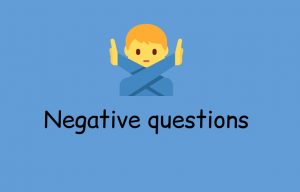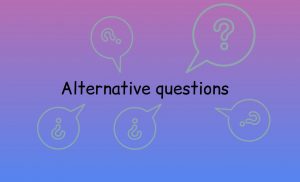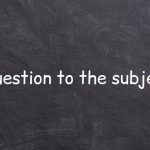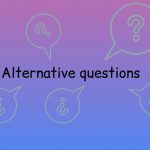We cannot do without questions. We ask questions every day. We answer questions every day. Asking questions and getting answers to them, we become smarter. By asking questions we learn.
How to ask questions correctly? What are the types of questions in English?
Don’t worry if you don’t know yet. This is an easy and very interesting topic.
General questions (Yes/No Questions)
In some languages, we can only ask questions using interrogative intonation. In English, in order to form a question, we need additional tools:
- Auxiliary verbs.
- Special word order.
These tools depend on the type of questions we ask.
A general question (Yes/No Question) is one of the most popular and frequently used ways to get information.
A general question is a question that we can answer simply YES or NO.

We ask a general question when we don’t need more information. We ask a general question when it is enough for us to get YES or NO.
In English grammar, we call these questions: Yes / No questions or General Questions.
Look at the examples:
Question: Are you going to work today?
Answer: Yes, I am.Question: Do you want us to have dinner at a restaurant?
Answer: No, I don’t want to, thanks.
The word order inversion plays an important role in such questions.
It means that we put the auxiliary verb at the beginning. Not the subject. We put the subject after the auxiliary verb. Then we put the main verb. Then we can add the rest of the sentence.
Do you like your new job?
Does she know the secret?

We can also use modal verbs in general questions. In this case, we don’t need any auxiliary verbs. Because modal verb can play the auxiliary role for itself.
In such questions, we put the modal verb at the beginning of the sentence. After the modal verb, we put the subject. Then we put the main verb. Then we can add the rest of the sentence.
Could you do me a favor?
Can we help you this time?
Should I pretend to believe all that nonsense?
To form a general question with the verb to be, we also do not use auxiliary verbs. The verb to be, like modal verbs, forms questions on its own.
Is he saying something behind my back?
Are we really doing this again?
Look at the detailed explanation of what a general question consists of, this will help you better understand how we form them:
Do you know the answer?
Do (auxiliary) you (subject) know (predicate) the answer (object)? (question mark)
Can you help me?
Can (modal verb) you (subject) help (predicate) me (object)? (question mark)
Are you a writer?
Are (verb to be) you (subject) a writer (rest of the sentence) ? (question mark)
Special questions (Wh-questions) in English
A special question differs from a general one in only one detail. A special question starts with a question word or question phrase.

We use a Special question to get additional information other than a YES / NO answer.
That is why a special question has a question word or phrase at the beginning.
Compare:
General yes / no question:
Will you go to work?
Special question with a question word:
When will you go to work?
We cannot simply answer yes/no to a Special question. Because a special question has an extra word or phrase at the beginning. This word or phrase influences the answer.
Question: Where were you yesterday?
Answer: I visited my friend Frank.
The word “where” in the question influenced the answer.
To ask a special question we usually use these question words:
- What?
- When?
- Where?
- Why?
- Which?
- Whose?
- Whom?
These question words begin with “Wh” so we often call special questions Wh-questions.
As you may have noticed, we use the same word order in Wh-questions as in General questions. We just simply add a question word (or question phrase) to the beginning of the question.
Question word + auxiliary / modal / to be verb + subject + predicate / object + rest of the sentence.
Take a look at examples:
When do you want me to leave?
Why do you stay with him?
What are you still doing here?
Why can’t you be with us tonight?
How long does he have to be in quarantine?
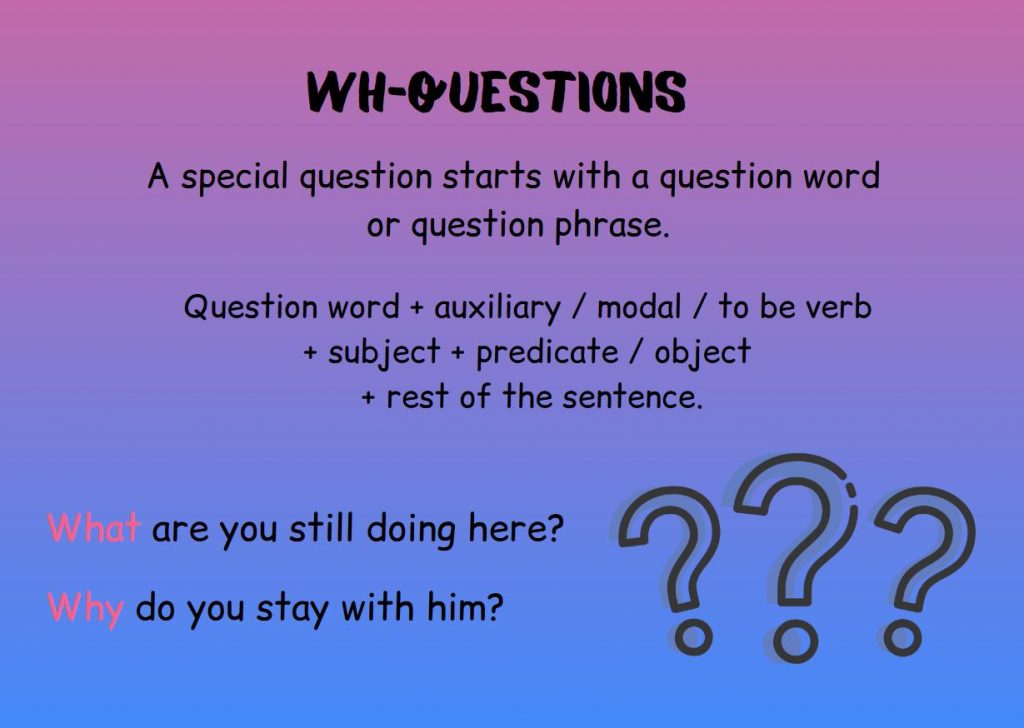
Questions to the subject in English
The next type of questions are Questions to the subject. We ask a question to the subject when we want to know WHO is performing the action.
Question: Who will go for a walk with you?
Answer: John.
Question: Who broke the cup?
Answer: Tom did it!Question: Who wants a slice of delicious pie?
Answer: I would not mind a piece of the pie …
The main feature of subject questions is that we don’t use any auxiliary verbs.
We just use the words Who or What instead of the subject.
If we ask a question to the subject in the Present Simple, then we add the ending -s to the main verb.
Question word + predicate + Secondary Parts of the Sentence
Who talks like that guy?
Who loves you?

Alternative questions
Another type of question that you should understand is alternative questions.
Why do we call these questions alternative questions? Because when we ask an alternative question, we not only ask but also offer alternatives for the answer! Doesn’t that sound interesting? Take a look at examples:
Do you like it or not?
Would you like tea or coffee?
We can ask an alternative question to any Parts of the Sentence.
Note the conjunction or in these examples. The conjunction or is an important feature of alternative questions.
It is the or that separates the answer options.
We form alternative questions almost in the same way as general questions.
Auxiliary verb + subject + action + answer option + or + answer option
Will you work at the central bank or one of its branches?
Alternative questions always have the or part.
Are you going to the cinema or the theater?
Have you played football or basketball?
If we want to use several auxiliary verbs in an alternative question, then we put the first auxiliary verb before the subject, and we put the remaining auxiliary verbs immediately after the subject.
Has John been working in this department or the next one?
We can easily turn an alternative question into a Wh Alternate Question (Special Alternative Question). To do this, we put a question word, or phrase at the beginning of the question:
Who do you prefer to work with John or Tom?
When did you decide to buy a new car, today or yesterday?
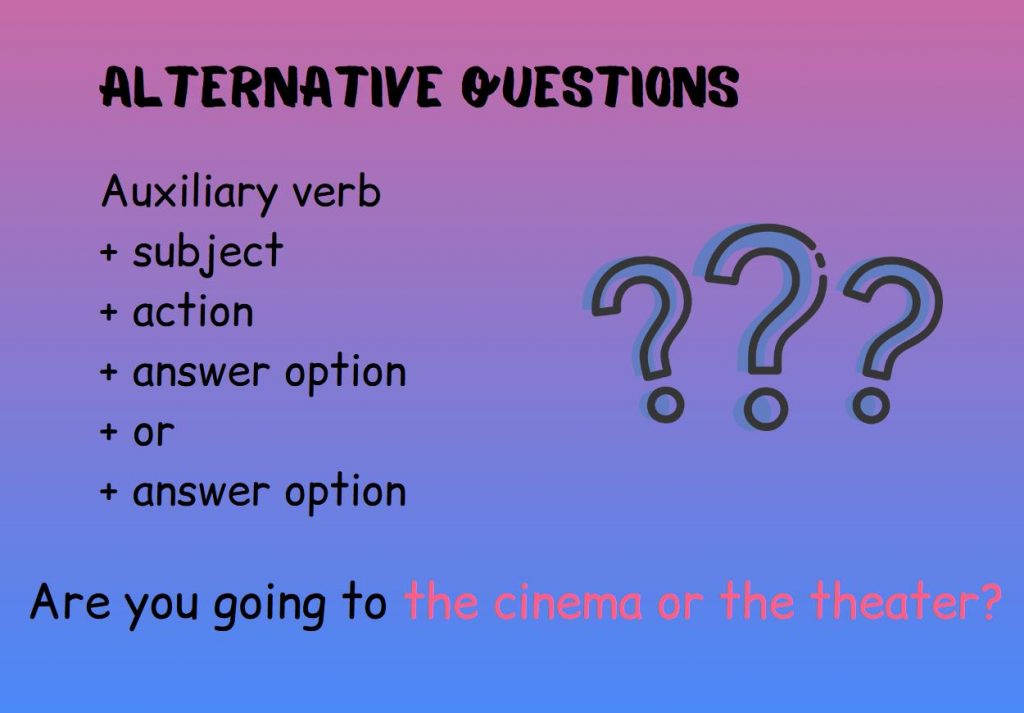
Tag Questions
Tag Question is a very interesting type of question in English.
For example, we ask General Questions just to get an answer (Often this is a simple yes / no answer). Often, when we ask a general question we do not know what the answer is.
When we ask a tag question, we often expect to hear confirmation of some information that we already know. That is, when we ask a tag question, we often know or mean what the answer is!
You’re going to see your grandmother, aren’t you?
You probably noticed that such questions do not look exactly like questions? Indeed, tag questions are more like affirmative sentences.
We DO NOT use question word order in tag questions. We use direct word order.
The main feature of this type of question is in the ending. The end of a tag question is called the tag. This is why we call them Tag questions.
You like her, don’t you?
To form such a tag, we put an auxiliary verb and the subject at the end of the sentence.
Any tag question has two parts:
- Affirmative or negative sentence.
- Tag at the end.
In the first part, we put what we think is the answer.
In the second part, we use the tag for confirmation.
He doesn’t want to talk to me, does he?
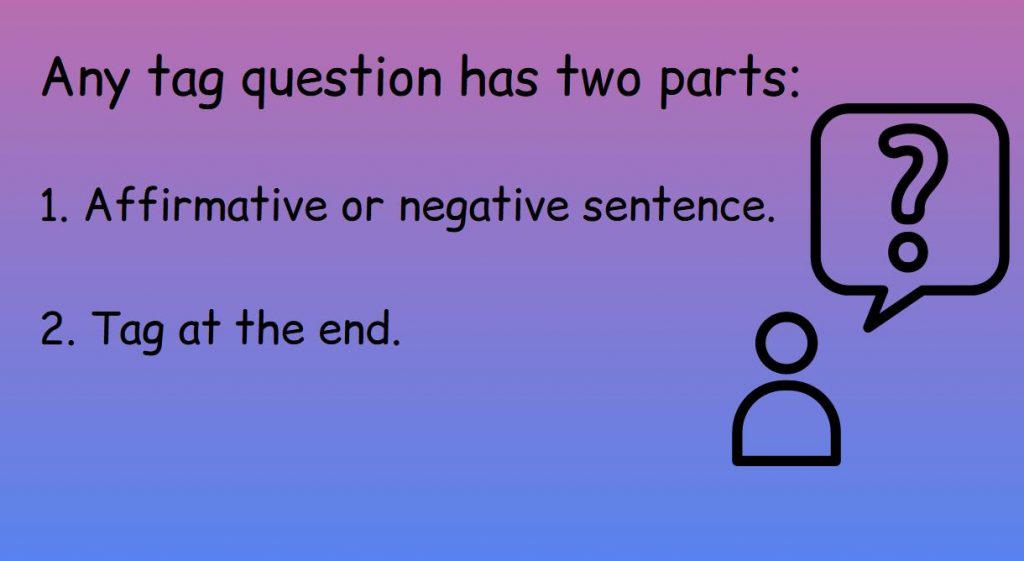
Tag questions are very popular and convenient in the English language. We use them all the time. We often ask tag questions to start a conversation.
We also use tag questions as a way to express feelings or emotions:
- surprise
- irony
- distrust
- skepticism
- doubt
etc.
He can’t beat me, can he?
They will help you, won’t they?
Janice doesn’t want to go to school anymore, does she?
We won’t be able to win this game, can we?
You better give up, don’t you?
If we form a tag question using the verb to have, then the end of the question can have several types:
British English: You have a new bike, have you?
American English: They have a new home, don’t they?
If we form such a question with the pronoun I, then:
- In the affirmative question, the auxiliary verb remains in the am form.
- In the negative form, the auxiliary verb changes to aren’t I. Because it is inconvenient to say am not.
Correct: I am not the perfect Princess, am I?
Correct: I am the perfect Princess, aren’t I?
Incorrect: I am the perfect Princess, am not I?
A tag question can be negative even if there is no negative particle not in the first part. Take a look at this sentence:
You rarely go outside, do you?
Note that the tag contains the verb do without the negative particle not. The first part of the sentence also has no negation. Why do we use do you instead of don’t you? Because the first part of the question contains the negative word rarely.
RULE: If the first part of a tag question contains a word with a negative meaning, then the tag part must contain a verb in a positive form.
Examples of negative words we often use:
- scarcely
- hardly
- rarely
- barely
- little
Etc.
You barely know him, do you?
We rarely work, do we?

Negative questions
There is another popular question type in English. These are Negative questions.
We can divide negative questions into two types:
Type 1: contracted negative questions
Type 2: uncontracted negative questions
We use Contracted Questions to express:
- a polite request
- criticism
- dissatisfaction
- remark
- invitation
Why don’t you get some more champagne?
Wouldn’t you object at this point?
Why don’t you take him shopping?
Contracted negative questions begin with words such as:
- Won’t you …?
- Wouldn’t you …?
- Why don’t you …?
We use the following word order in contracted negative questions:
auxiliary verb + ending n’t + subject
Take a look at examples:
Won’t you guys go up with me, please?
Why don’t you keep your thoughts to yourself?
Wouldn’t you like to refresh yourself?
Won’t you please reconsider my request?
Such questions are considered less formal.
If you want to give a positive answer to this type of question, you should answer: YES. In case of a negative answer, you should answer: NO.
Haven’t you read what I wrote?
Yes.Haven’t you been dreaming about this?
No.Haven’t you people heard anything?
No.

Now let’s look at uncontracted negative questions. Such questions are more formal than contracted negative questions.
We form uncontracted negative questions using the following scheme:
Auxiliary verb + subject + not
See how it looks with examples:
Why do you not tell them I am here?
Do you not recognize your own best friend?
Why do you not want to help me?
Have you not figured that out?
Has he not been true to his vow?
Are they not a shame on their country?
Do you not dare to face me?
Have you not seen The Voice?

Hello! If you would like to thank me for the articles I wrote, you can click Buy me a coffee. Thank you! ❤❤❤


